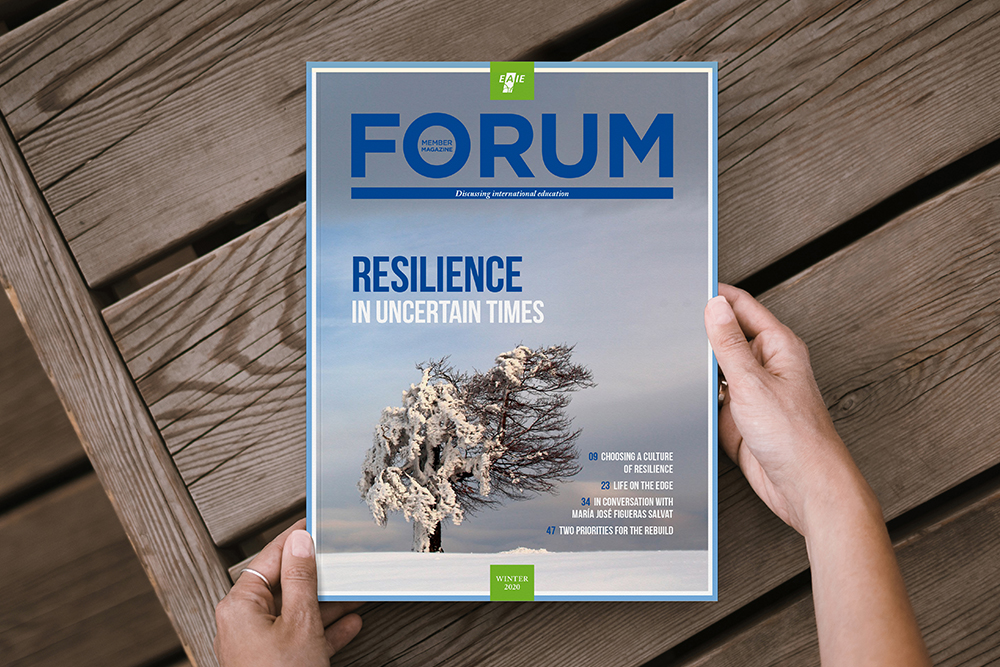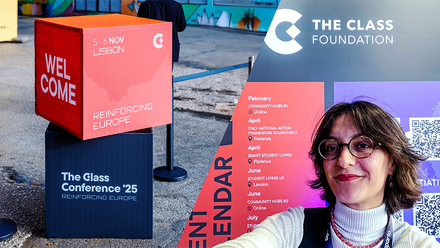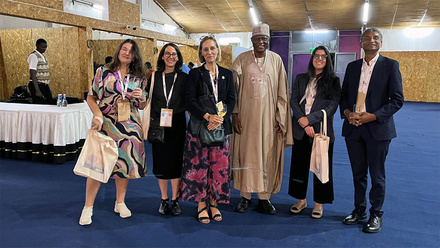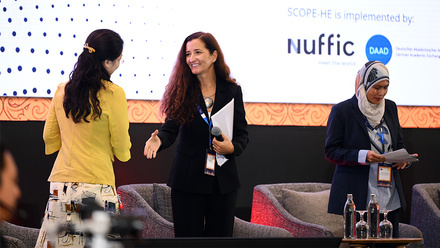Resilience in uncertain times

Today we're proud to launch the 2020 Winter edition of Forum magazine on ‘Resilience in uncertain times’. There is much talk of resilience in the face of the COVID-19 pandemic, be it personal, professional, or institutional. Indeed, many of us have been called upon to reflect on our own capacity to cope with change and uncertainty in a world turned upside down. But what does resilience mean in the context of international education, and is it a new concept?
International education is certainly no stranger to external threats, be they from natural disasters, economic recession or the evolving climate crisis and its connection to a set of activities and initiatives generally predicated on cross-border travel. In response to these challenges, institutions, staff and students have shown themselves to be both resilient and resourceful, working collaboratively to identify new solutions and sharing best practices as they arise.
What lessons have we learned from the past, and how are these being applied in the face of the current pandemic? The contributions to this edition of Forum magazine draw on personal, programmatic and institutional examples to shine a spotlight on different understandings of resilience in the face of uncertainty. In so doing, they highlight some of the values and skills inherent in international education, including the ability to think on our feet in a rapidly changing world.
A panoply of national perspectives
I’m delighted that Professor María José Figueras Salvat, Rector of Universitat Rovira I Virgili in Catalonia and President of the Catalan Association of Universities, agreed to be interviewed for this edition. As a Professor of Microbiology, Professor Figueras has unique insights from her academic background, which has helped her to understand resilience as a modus vivendi or way of life, rather than as a short-term adaptation to a challenging environment. I also appreciated Professor Figueras’ candid reflections on the collateral damages and collateral benefits of a crisis (the silver lining to the proverbial cloud) and I hope that the readers of this edition have been able to find the space to reflect on what we have gained during the current crisis, rather than just on what we may have lost.
Beyond the interview, this edition features a series of articles from authors in Europe and further afield who explore resilience from various perspectives. In light of the COVID-19 pandemic, it is not surprising that many of the articles centre around the immediate necessity of resilience in response to the ongoing public health crisis. However, a number of the authors draw parallels with other disruptions to international education policy and programming, showing us that a comparative approach can provide useful guidance to contemporary dilemmas.
Resilience can be a way of life, rather than a short-term adaptation to a challenging environment
From a macro perspective, contributions by Ian Rowlands (in Canada) and Sabine Klahr & Harvey Charles (in the USA) highlight the opportunities for leadership in a crisis and reflect on the resilience and flexibility which are inherent in internationalisation as a process of change. A series of articles then looks at national context, drawing parallels with other tests of resilience. For example, Maria Eugenia Jimenez, Paulina Latorre and Lorena Vieli outline how recent civil unrest in Chile has affected institutional strategies for internationalisation. Similarly, Samia Chasi and Orla Quinlan discuss how societal inequalities in postcolonial South Africa have influenced institutional responses to the current crisis.
Resilience in practice
Writing in the path of an impending hurricane, Stephanie Doscher (in the USA) and Alex Rendón (in Ecuador) then plot out a set of key steps which institutions can take to design a more resilient internationalisation in the face of increasing threats and uncertainty. A further institutional case study is offered by Laurence Dupont in France, who highlights how INSA Lyon has supported academic and professional staff, as well as students, to ensure academic continuity in response to COVID-19.
Writing on a topic of growing interest to many international educators, Nawazish Asim (in Saudi Arabia) draws us back to the topic of the 2020 Spring Forum by encouraging us to consider how digital transformation serves to foster resilience in internationalisation. With blended learning and blended mobility on everyone’s lips, this article sets the scene for a series of contributions which look at how programme delivery has responded to the current public health crisis. In this vein, Leslie Hitch (in the USA) describes how she moved programme delivery online for a group of MBA students in Poland, while Alexander Heinz & Nita Kapoor (in the UK & Norway) outline opportunities for experimentation and transformation in summer school programming and pedagogy. Grazia Ceschi and Mathieu Crettenand then speak to how an academic integration programme in Switzerland has responded to COVID-19 in support of the successful adjustment, resilience and general well-being of refugee students.
Cultivating personal resilience
Turning to questions of individual resilience, Sancha Elevado, Andrew Horsfall, Sapna Thwaite, Renee Welch and Kelly Richmond Yates (from the USA) highlight how they have continued to build on the cross-cultural dialogue established with German colleagues, following their participation in the Fulbright Commission’s International Education Administrators Seminar in Germany. Meanwhile, Juan Rayón González, President of the Erasmus Student Network in Spain, offers a student perspective on mobility during a crisis, and Frank Haber and Jessica Price (in Germany) provide advice for all on how to build psychological resilience.
With thanks to my colleagues on the EAIE Publications Committee for their expert support in reviewing submissions for this edition of Forum. We hope that this selection of articles on the topic of resilience will support and guide you in your work, as well as in your day-to-day life in these uncertain times.






